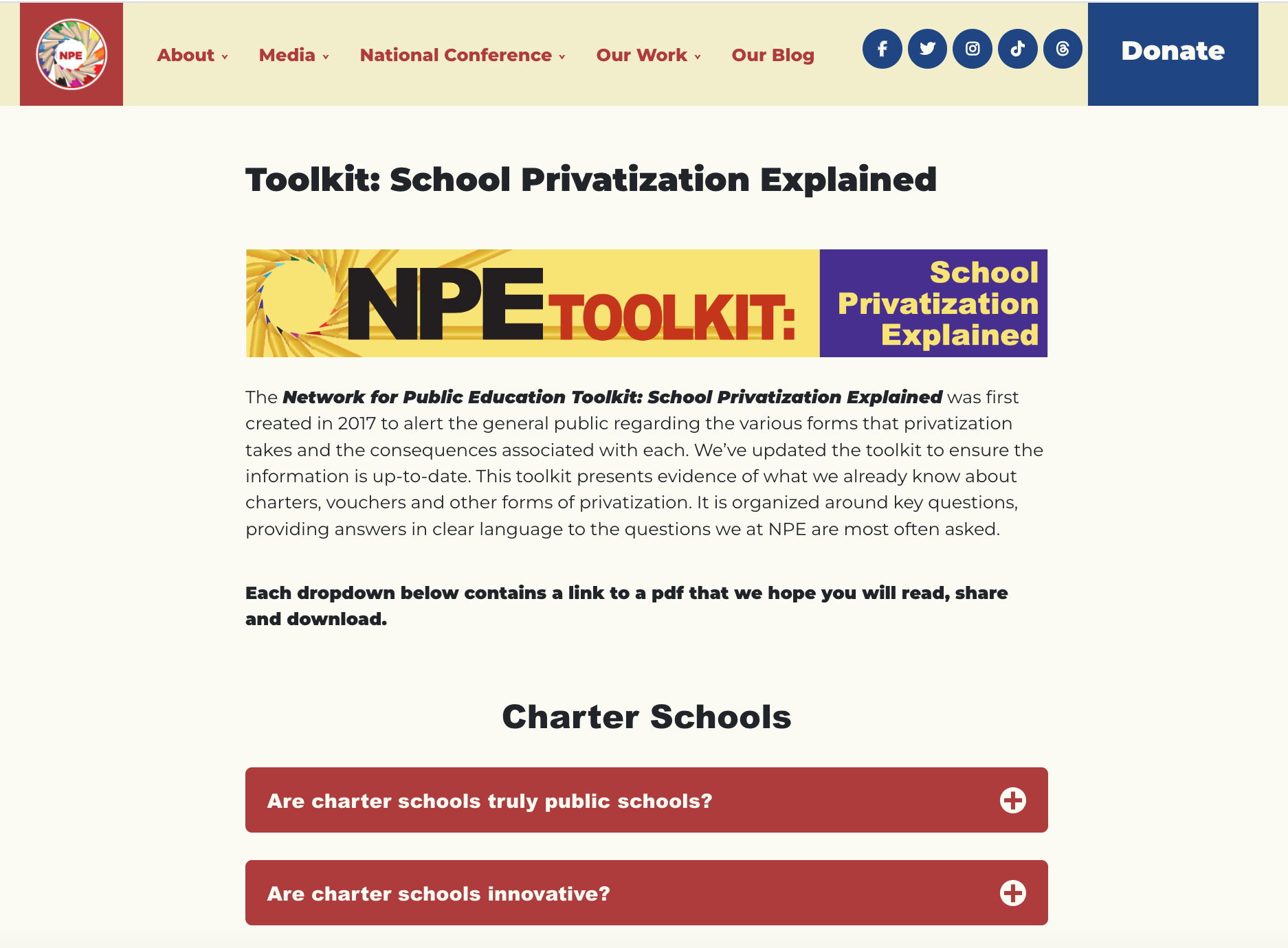ALL RESOURCES
FILTER BY TAG
Select a tag
- Academic performance
- Accessibility
- Accountability
- Advocacy
- Advocates
- Article
- Bill analysis
- Bill tracker
- Billionaires
- Blog post
- Civil rights
- Coalition building
- Community Schools
- Cost impact analysis
- Dark Money
- Data
- Disability
- Discrimination
- Drain funds from public education
- Education Savings Account (ESA)
- English language learners
- Fact sheet
- Fraud Waste and Abuse
- Graphic
- History
- Indigenous and Native Education
- Integration
- LGBTQ+
- Legislation
- Letter
- Litigation
- Messaging or talking points
- Model legislation
- National Voucher
- News
- Parents
- Personal narrative
- Podcast
- Policy brief
- Policymakers
- Radio
- Referendum
- Religion
- Report
- Rural communities
- Segregation
- Separation of church and state
- Slide deck
- Slides
- State Constitutional Right to Education
FILTER BY AUTHOR
Select an author
- Aaron Sanderford
- Alec MacGillis
- Allen Pratt
- Associated Press
- Bob Peterson
- Bruce Schreiner
- Catherine Caruso
- David Montgomery
- David Pepper
- Eli Hager
- Emily Walkenhorst
- Ethan Dewitt
- Geoff Mulvihill
- Hilary Wething
- Howard Fischer
- Jason Bailey
- Jessica Corbett
- Jim Collier
- Joe Dana
- Joshua Cowen
- Juan Perez Jr.
- Kiera Butler
- Laura Pappano
- Liam Amick
- Maurice Cunnningham
- Nora De La Cour
- Paige Masten
- Patrick Darrington
- Paul Hammel
- Phil Williams
- Rob Boston
- Robert Huber
- Rowan Moore Geretsy
- Sasha Pudelski

Voucher Boondoggle: House Advances Plan to Give the Wealthy $1.20 for Every $1 They Steer to Private K-12 Schools
While there was never any question as to whether the committee’s majority supported private school vouchers, this is the first time they have gone on the record specifically endorsing the kind of profitable tax shelter embedded in many voucher programs. As we learned yesterday, most of the House Ways & Means Committee is content to facilitate new forms of wasteful tax avoidance if doing so aids the cause of funneling more public resources into private K-12 schools.

Florida Private Education Vouchers Cost $4 Billion This School Year
Florida is already deeply underfunding its public schools. The state sits at the bottom of the national school funding rankings in ELC’s Making the Grade 2024 report, scoring grades of ‘F’ for funding level, for inequitable distribution of that funding, and for funding effort. As funding for private education vouchers has increased, it is consuming an ever larger portion of overall taxpayer funds directed to education, increasing from 12% of public funds spent on education in 2021-22 to 23% this year.

How to Fight Vouchers in 2025: A Toolkit for Advocates
This PFPS webinar featured ELC Senior Fellow Josh Cowen, Nicole Fuller from the National Coalition for Public Education, and speakers from PFPS/ELC who shared information, resources, tools, and tips to help advocates prepare for crucial state and federal legislative fights over private school voucher programs in 2025.

The Impact of Diverting Public Money to Private School Vouchers in Kentucky
The Kentucky General Assembly enacted a private school voucher program in 2021 and legislation was filed to expand the program before the state Supreme Court struck it down for violating Kentucky’s constitution. That decision led directly to the legislature putting Amendment 2 on the ballot. Similar states that lack Kentucky’s constitutional protections for public education have recently increased spending on vouchers and school privatization at a rapidly growing cost to their budgets. Given that history and context, it is plausible to assume the legislature will pursue a similar path if voters approve the amendment.

How Voucher Programs Undermine the Education Landscape in North Carolina
In 2023, North Carolina lawmakers went all-in on vouchers. Via changes incorporated in the 2023 budget bill, North Carolina became the tenth state with a universal voucher program, one in which all private school students are eligible for state-funded subsidies regardless of their family income.

Dark Money Vouchers Are Having a Moment
Over the past 12 months, the decades-long push to divert tax dollars toward religious education has reached new heights. As proclaimed by EdChoice—the advocacy group devoted to school vouchers—2023 has been the year these schemes reached “escape velocity.” In strictly legislative terms, seven states passed new voucher systems, and ten more expanded existing versions. Ten states now run eleven universal voucher programs, all of which have no meaningful income or other restrictions.

Research on school vouchers suggests concerns ahead for education savings accounts
Private school choice is having quite a moment. Whether structured as traditional school vouchers paying direct appropriations for private tuition, scholarships funded by redirected state income tax liabilities, or as new education savings accounts (ESAs), the use of public funds for private schooling has never been more prominent. In 2023 alone, seven states passed new programs and nine expanded existing plans. This push is largely a red state phenomenon. Of the new or expanded private choice states, all but two went for Donald Trump in the 2020 election.

School Vouchers Would Increase Costs for Local Taxpayers
State lawmakers are considering legislation that would expand the Missouri Empowerment Scholarship Accounts Program, or vouchers. The expansion of school vouchers and associated tax credits would divert state funding from local, neighborhood public schools.

Toolkit: School Privatization Explained
The Network for Public Education Toolkit: School Privatization Explained was first created in 2017 to alert the general public regarding the various forms that privatization takes and the consequences associated with each. We’ve updated the toolkit to ensure the information is up-to-date. This toolkit presents evidence of what we already know about charters, vouchers and other forms of privatization. It is organized around key questions, providing answers in clear language to the questions we at NPE are most often asked.

Conversation Points With Clergy
This toolkit includes talking points and fact sheets from anti-voucher arguments to the imperative of faith/school leader partnership.

Opposing Private School Vouchers:A Toolkit for Legislators and Advocates
This toolkit is designed as a resource to help legislators and pro-public education advocates oppose attempts to create new or expand existing private school voucher programs.
In recent years, a network of anti-public-education politicians and lobbying groups has been emboldened in its push for private school vouchers. Billionaires like the DeVoses, including former Education Secretary Betsy DeVos, the Kochs, and the Waltons are spending hundreds of millions of dollars on these campaigns. These funders are using their war chests to lobby for voucher bills in state legislatures, contribute to the political campaigns of pro-voucher candidates, and seed astroturf petition drives to put vouchers on the ballot.

5 Reasons Private School Vouchers Would Hurt Students – Infographic
IDRA 5 Reasons Private School Vouchers Would Hurt Students – Infographic


Who Supports Illinois’ Invest In Kids Voucher Program?
Voucher programs around the country—whether in the form of traditional vouchers, education savings accounts (ESAs),or tax credit scholarships—are supported by well funded and organized groups. These include: Americans for Prosperity (the Koch brothers’ 501c4), the American Legislative Education Council (ALEC), the American Federation for Children (Betsy DeVos’ 501c4), Moms for Liberty and the Heritage Foundation, among others.
What do these organizations have in common? They work openly to discredit public schools and push a privatization agenda, using the slogans of school choice, education freedom and parent rights. Many of them were on the ground working on the April 2023 school board elections in Illinois.

Voucher Web page
This web page from Illinois Families for Public Schools includes blog posts covering school voucher programs in Illinois.

Game Over for School Vouchers in Illinois!
In 2017, as a result of a backroom deal between then Governor Rauner, legislative leaders and the Archbishop of the Archdiocese of Chicago, the IL General Assembly created a K-12 voucher program for Illinois in the form of a tax credit scholarship scheme. Known as the Invest in Kids Act, the law allows up to $75 million in tax revenue to be diverted to private schools each year. More than $250 million state dollars have now been siphoned off to private schools in our state.
This program was intended to last for five years and to sunset after the 2022-2023 school year. It was extended for one additional school year already. Voucher supporters and school privatizers want it to be made permanent and expand!

#SCHOOLVOUCHER SCAM$
Our Voucher School Scam$ page, which we began in September of 2023 in response to the recent flood of irresponsible universal voucher programs includes a sorting feature that allows you to search charter scandals by state and by 12 categories. You can also search by keyword. Just use the ‘X’ to clear search terms and return to the full list of scandals.

Fund what works: Public dollars for public schools
Regardless of race, neighborhood, or how much money is in their parents’ bank account, every child should be able to attend an excellent school that has everything they need to learn and grow. Every dollar spent on vouchers makes this vision less achievable. Vouchers take public money and give it to private schools, with real consequences for the 90% of our kids who attend Ohio's public schools.

SOS Arizona Network Blog
This web page from Save Our Schools Arizona is includes blogs on Arizona’s voucher program.

New analysis shows many private schools in N.C. have more vouchers than students
This session, General Assembly leaders have placed a massive expansion of the state’s voucher program at the top of their education agenda. Legislative leaders in both the House and the Senate want to triple the program’s size by opening it to wealthy families who have already enrolled their children in private schools. But new data shows that the existing program lacks adequate oversight and is potentially riven with fraud.
Data from the two agencies charged with overseeing private schools and North Carolina’s Opportunity Scholarship voucher program show several cases where schools have received more vouchers than they have students. Several other private schools have received voucher payments from the state after they have ceased submitting enrollment data.
